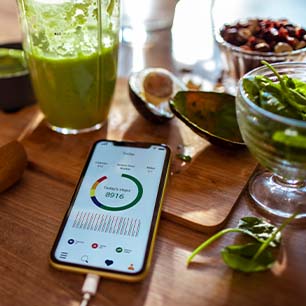Updated October 23, 2025
Our Publix registered dietitians answered some frequently asked wellness questions.
Frequently asked wellness questions.

Finding motivation.
Q: I want to lose weight, but I need some motivation. I have tried eating more fruits and vegetables, but my habits don’t seem to stick.
A: Finding motivation can be challenging depending on what we have going on in our lives. The best way to find motivation is starting with what you want your end goal to look like. What are you willing or ready to change? Something I found to work is creating a SMART goal. SMART stands for Specific, Measurable, Attainable, Relevant, and Time-based. Understanding why you want to create a goal is important, but building it with intention makes it reachable.
- Specific: Don’t make the goal too broad; make it specific to fit your needs.
- Measurable: Indicates progress toward your goal.
- Attainable: Is the goal realistic to you?
- Relevant: Does the goal align with what you want long-term?
- Time-based: Give a timeframe of when you want this goal to be completed.
SMART goal example: I will lose 20 pounds by walking for 30 minutes 5 days a week for the next 6 months.
Generic goal example: I want to work out.
—Nicole Orr, MS, RDN/LDN
Setting goals.
Q: Now that I have my why, I am ready to get started. What’s next?
A: Set your goals, track your progress, and keep going.
- Set your goals. Make them simple, realistic, and easy to measure. If your goal is to lose 20 pounds, think about what it may take to do that. You can plan to walk three times a week or pack a lunch for work instead of going out.
- Track your progress. Once you’ve set the goal, make sure you don’t forget about it. The best way to remember is to keep track of your progress and build a routine. For example, if you use a daily planner or calendar on your phone, you could schedule a progress check-in at the beginning or end of each week.
- Keep going. A misstep here and there doesn’t mean all progress made is no longer relevant. One step back can lead to five steps forward. Remember: Health is a practice, not a destination.
—Anastasia Kyriakopoulos, RDN/LDN
Make small changes.
Q: Setting goals sounds great, but I work a full-time job and have kids at home. What are some small changes that can get me started?
A: The path to better health can feel overwhelming. Trying to make big changes in your diet, weight, or exercise may seem drastic or unrealistic, especially if you try to tackle them all at once. But like any journey, it takes just one step to begin. Try one of these for a week and if you like it, keep going. Or try another one on the list until something clicks for you.
- Take a 10-minute walk.
- Make sleep a priority.
- Instead of mindless munching, focus on smarter snacking.
- Park farther away at work or when grocery shopping to take more steps.
- Drink more water. Carry a water bottle with you to work or when running errands.
- Read nutrition labels.
- Make breakfast count with our simple solutions.
—Shannon McManus, RDN/LDN
Keto & paleo.
Q: My friends are doing keto and paleo diets and have seen success with them. Are these diets healthy, and do they work?
A: Trendy diets like paleo and keto may help you lose weight, but following them long-term may not be ideal for your overall health. Take time to explore the pros and cons of these two diets. Need some meal ideas? Our recipes can help you get started.- Paleo-inspired: One-Pan Broiled Salmon and Vegetables
- Keto-inspired: Protein Packed Pepper Stack
—Publix Dietitian Team
Plant-based.
Q: I see so many plant-based products at Publix. These products are trendy, but are they healthy?
A: Plant-based foods are trendy, but just because foods are made from plants does not mean they are better from a nutritional perspective. Be sure to check out the nutrition facts panel and take a look at the list of ingredients before buying. Get more tips on choosing plant-based foods.
—Liz Chapman, MS, RDN/LDN
Intuitive eating.
Q: I have tried so many diets, and they never seem to work. I end up losing weight, but then I gain it back plus more. I have heard about intuitive eating and want to learn how to listen to my body’s hunger and fullness signals. Tell me more about it.
A: Intuitive eating is trusting your intuition on how to make a choice around foods that feel good for your body. Intuitive eating is very individualized and may look different from person to person. There are 10 principles of intuitive eating to help listen to your body’s hunger and fullness signals.1
- Reject the diet mentality
- Honor your hunger
- Make peace with food
- Challenge the food police
- Discover the satisfaction factor
- Feel your fullness
- Cope with your emotions with kindness
- Respect your body
- Movement—feel the difference
- Honor your health—gentle nutrition
1Kaminski, Jacqueline. Intuitive Eating Explained. NASM. Accessed July 10, 2023.
—Nicole Orr, MS, RDN/LDN
Mediterranean.
Q: I have a history of heart disease in my family, and my doctor recommended that I try the Mediterranean diet. How do I get started?
A: The Mediterranean diet is a delicious and satisfying way to eat, and it may have health benefits as well. Research shows that the Mediterranean diet may help reduce the risk of cardiovascular disease and type 2 diabetes, and it has other health benefits.
—Shannon McManus, RDN/LDN
Gut health.
Q: I have so many issues with my gut health and need to focus on that this year. Do probiotics really work?
A: In short, yes. A great deal of research has been done on probiotics and how helpful they can be for our guts. We are still discovering their potential health benefits. Learn more about probiotics and prebiotics. If you have concerns about your gut health, make sure you discuss this with your doctor.
—Anastasia Kyriakopoulos, RDN/LDN
Immunity.
Q: I am concerned about getting sick from different viruses. Is there anything that I can do to boost my immunity?
A: While you may not be able to completely prevent getting sick, there are several ways to help support your immune system. The immune system is complex and is influenced by many factors. Stress management, good sleep, exercise, and a nutrient-dense diet all help support your immunity. Focusing on a balanced diet consisting of a variety of fruits and vegetables will help provide your body with the vitamins and minerals it needs to stay healthy.
—Aria Hetzendorfer, RDN/LDN
Shopping assistance.
Q:I have my goal in mind, and I am ready to shop. At the store, I get overwhelmed with so many products. Can you help me shop for the foods to support my health and wellness goals?
A: We have a shelf tag program that helps you shop with your goals in mind. Our Better Choice shelf tags are managed by our team of registered dietitians. They identify products that have more of the nutrients you need, like fiber, and less of the things that you don’t need, like saturated fat, or added sodium, or added sugar, when compared to other similar products. So when you’re standing in front of the pasta sauces and don’t know which one to choose, look for the Better Choice shelf tag. We also have icons for gluten free, vegan, organic, and made without.
—Liz Chapman, MS, RDN/LDN
For the love of you.
Choosing how you eat is uniquely personal. It’s about your needs, your preferences, and your goals. As your wellness ally, we’re in your corner with fresh ideas, recipes, and wellness icons that make it easier to shift toward wiser food choices. It’s all about you, at your very best.

 You are about to leave publix.com and enter the Instacart site that they operate and control. Publix’s delivery and curbside pickup item prices are higher than item prices in physical store locations. Prices are based on data collected in store and are subject to delays and errors. Fees, tips & taxes may apply. Subject to terms & availability. Publix Liquors orders cannot be combined with grocery delivery. Drink Responsibly. Be 21. For prescription delivery, log in to your pharmacy account by using the Publix Pharmacy app or visiting
You are about to leave publix.com and enter the Instacart site that they operate and control. Publix’s delivery and curbside pickup item prices are higher than item prices in physical store locations. Prices are based on data collected in store and are subject to delays and errors. Fees, tips & taxes may apply. Subject to terms & availability. Publix Liquors orders cannot be combined with grocery delivery. Drink Responsibly. Be 21. For prescription delivery, log in to your pharmacy account by using the Publix Pharmacy app or visiting 
